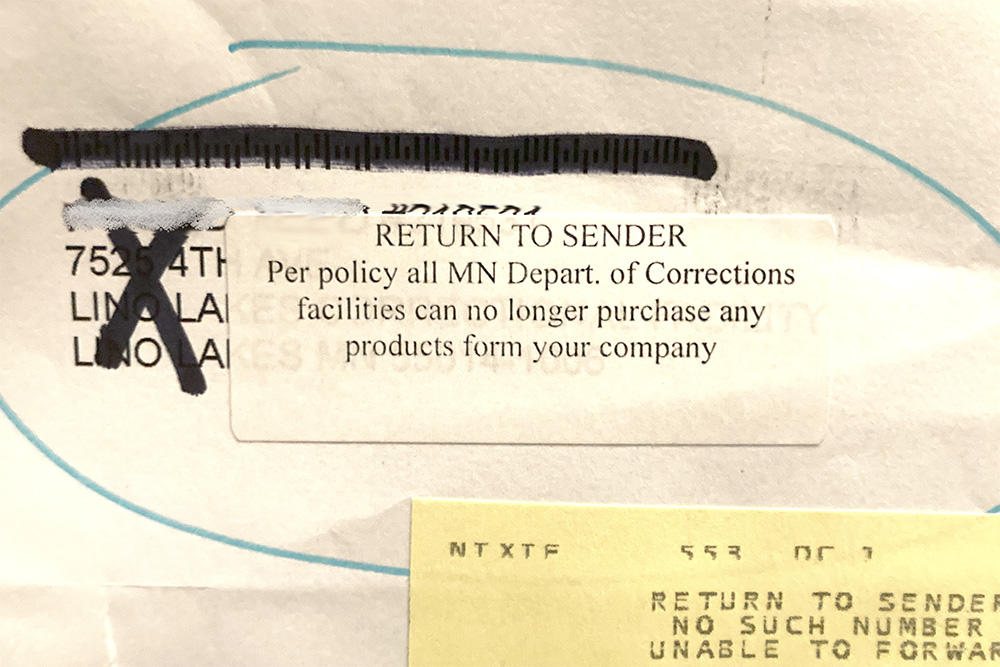
* Sign the online petition to Commissioner Paul Schnell, Let Our People Read!
MN DOC’s new policy on books, signed by DC Jones on 11/25/24, amounts to a de facto ban on all books for people in DOC custody.
For immediate release – December 16, 2024, updated December 19, 2024
TO: Commissioner Paul Schnell, Minnesota Department of Corrections
CC: Deputy Commissioner Connie Jones, MN DOC, Assistant Commissioners Eddie Miles and Jami Doeden, MN DOC, Deputy Assistant Commissioner Crystal Brakke, MN DOC, Representatives Kelly Moller, Sandra Feist and Cedric Frazier, MN House, Senators Sandra Pappas, Clare Oumou Verbeten, and Ron Latz, MN Senate, Margaret Zadra, Ombudsperson for Corrections
- Five of the approved “vendors” are large commercial publishing houses. Two of these (Macmillan and HarperCollins) do not directly retail books to consumers. Their books can only be purchased through retailers like Amazon, Walmart and Books a Million. While the other three publishers do sell (some) of their books directly to consumers, they only do so on their websites, not by mail, and they only accept payment via credit card. Their book catalogs are also only available online, not in a hard copy form that could be requested by mail. It is unclear how incarcerated people themselves could obtain a book from any publisher on the list, since they lack both internet access and credit cards. Further, publishers almost always charge full cover price for their books, while retailers offer the same titles at significant discounts.
- The only true retailer on the list is ER Hamilton, which will also provide a print book catalog and accept payment by check or money order. However, ER Hamilton carries only 28,000 titles. The reality is that without a loved one on the outside with the disposable income and connectivity to order books, incarcerated readers in MN are out of luck.
- Smaller, independent presses publish many works of great literary merit. The new policy unfairly discriminates against such publishers by favoring the large corporate houses. It also discriminates against LGBTQ+ people, since books of interest to LGBTQ+ readers are typically published by smaller, boutique presses.
- All of the “vendors” on the list are commercial entities who charge high prices for books. Incarcerated workers in MN earn $0.25/hr. The percentage of incarcerated people who can afford to purchase books at full retail price is near zero. This is yet another example of families and friends being asked to bear the financial burden of having a loved one incarcerated.
- Personal reading is one of the primary ways that incarcerated people educate themselves, especially those who have already earned a high school credential. Education is the single most effective factor in reducing recidivism.
- 30-40 nonprofits nationwide provide books to incarcerated people at no cost. Many have been doing this for 50+ years without a single proven security incident. Here is a public list of such providers. The 11/21/24 policy excludes all such organizations as acceptable book vendors.
- Nonprofit book programs are the safest senders of books into prisons and jails due to the highly decentralized, non-vertically integrated ways in which they build their inventories and fulfill book requests from individual incarcerated readers. Because none of these organizations transacts money with book requestors, there is no financial incentive to introduce contraband. Second, these organizations are staffed by book lovers and people who want to help, not harm, incarcerated people.
- MN DOC’s tablet program is in disarray, and even those tablets still in working order contain only books included in Project Gutenberg (so old they are in the public domain, e.g., Shakespeare, Dickens, etc). The National Corrections Library/Project Gutenberg does not contain the kind of up-to-date books most incarcerated people wish to read.
- Reading is one of the healthiest, most constructive things an incarcerated person can do. 30 minutes of reading has been found to be just as effective as yoga in reducing stress, lowering heart rate and blood pressure, and lessening feelings of psychological distress. Reading frequently and broadly is also positively correlated with critical thinking, the skill at the heart of the cognitive behavioral programs widely used in prisons. Reading fiction is strongly associated with empathy development and perspective-taking. In all of these ways, access to books and reading materials directly benefits institutional security and inmate rehabilitation.
For all of these reasons, we respectfully ask you to rescind the 11/21/24 book policy and adopt the model policy below.
“Adults in MN DOC custody may receive paperback or hardback books and publications in new or used condition from any nonprofit organization in the United States. Such books must be: sent via the U.S Postal Service; free of all contraband; not detrimental to institutional security; and provided free of charge to requestors. MN DOC will not restrict any adult in custody from requesting books and reading materials from such organizations.”
By doing this, MN DOC can set a positive example for other jurisdictions to follow and attract positive media attention.
Signed:
- Kelly Brotzman, PhD, Executive Director, and Mike Wood, Director of Institutional Relations, Prison Book Program (Quincy MA)
- Andy Chan, PhD, Executive Director, Seattle Books to Prisons (Seattle WA)
- Moira Marquis, PhD, Founder, Prison Banned Books Week and Director, Saxapahaw Prison Books (New York NY)
- Simon Carless, Prisoners Literature Project (San Francisco CA)
- Alexandra Schoenborn, Coordinator, Books Beyond Bars (New York)
- Sandy Bove, Executive Director, Books Behind Bars (Wildwood, NJ)
- Camy Mathay, Cofounder, Wisconsin Books to Prisoners (Madison, WI)
- Claire Swanback, Treasurer, Portland Books Through Bars (Portland OR)
- Midwest Books to Prisoners (Chicago, IL)
- Scott Odierno, Inside Book Project (Austin TX)
- Gary Fine, Program Director, Prisoner Express (Ithaca, NY)
- Bonnie Porter, Director, Louisiana Books 2 Prisoners (New Orleans, LA)
- LGBT Books to Prisoners (Madison, WI)
- Daniel Schaffer, NYC Books Through Bars (New York NY)
- Julie Schneyer, Director, Asheville Prison Books (Asheville NC)
- Katie Yow, North Carolina Women’s Prison Book Project (Durham NC)
- Rachel Rasmussen, Coordinator, Urbana-Champaign Books to Prisoners (Urbana, IL)
- Shannon Wadlington, Director, Books to Prisons (Birmingham AL)
